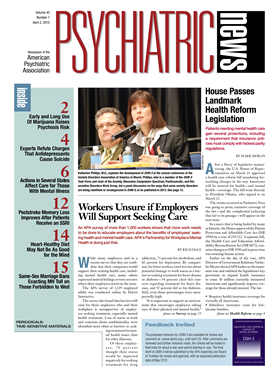We have all encountered demanding, noncompliant, drug-seeking, angry, or needy patients in our clinical practice. These patients are sometimes referred to as a psychiatrist's worst nightmare.
Residents have limited exposure to difficult patients—patient-selection bias, limited ability to provide longitudinal care for difficult patients, and concerns about intimidation of residents all play a role in restricting our experience with such patients. Residents reluctantly assume or continue caring for difficult patients and often transfer care to their supervisors. As a result, the responsibility for acquiring skills to manage difficult patients rests with each resident. In this column I want to share experiences and views on caring for difficult patients.
My most challenging patient was an angry veteran who threatened to terminate his care and even complained to his senator about it. His extreme dissatisfaction and sense of entitlement posed problems for a clinician trying to help him. As I volunteered to care for the veteran, I knew I had to do more than mollify him.
I focused on the nature of “difficult” interactions between the veteran and clinicians rather than on his personal attributes. The veteran felt his previous psychiatrist was ignoring his physical complaints and had misdiagnosed him. He felt he had nothing to gain from the proposed treatment, thus giving him reason to resent the provider, treatment, and hospital. Using a compassionate, intuitive, and nonjudgmental approach, I was able to put the patient at ease, which in turn helped me identify the underlying issues he had with trust and security. With his consent, I involved his family, which helped change his negative attitude about proceeding with treatment.
I have also cared for patients who were stubborn, used self-sabotaging behaviors, and had triggered strong countertransference feelings in their clinicians. Each case posed unique challenges. I patiently listened to their concerns and found it crucial to identify core issues responsible for difficult or inappropriate behaviors. Although simple and intuitive, clinicians sometimes overlook this point and are quick to label patients as difficult. I uncovered deep-rooted feelings of fear and intimidation in a patient with schizophrenia, for example. Her cocaine abuse and noncompliance with treatment resulted in frequent relapses, with multiple inpatient admissions. She had poor insight about her drug abuse and exploited people for money and sex. Some of her behavior stemmed from her living situation, but by arranging a placement for her in a group home, I was able to bring about a change in her attitude and behavior toward the treatment team.
Difficult patients fear loss of control and have issues with self-image, trust, and security. You can often gain their trust and connect with them by finding common ground. Once you establish this connection, they are more willing to listen to you. One of my patients struggled with social nonacceptance of her gender-identity disorder. I shared my personal experiences of adapting to a new culture, which helped her realize that she was not alone and instilled confidence in her ability to overcome her negative feelings about her disorder.
There is more to managing difficult patients than relying on pharmacotherapy. One of my patients who had autism and aggressive behavior and was on maximum doses of psychotropics was refused care by multiple group homes. I used psychodynamic and culture-based techniques to make an interpretation: “A man would never hit a woman.” This helped the patient identify himself as a mature and grown-up man, thereby offering him the choice of not being aggressive. Despite no medication adjustments, his emergency department visits and hospitalizations decreased.
Here are some suggestions for residents that have helped me when dealing with difficult patients.
•.
Use your innate parenting skills to convey a caring attitude while simultaneously setting limits.
•.
Don't deceive patients by making false promises or impossible claims.
•.
Document meticulously. If indicated, terminate the doctor-patient relationship, but be aware of rules regarding abandonment.
•.
Be your patients' best advocate!
•.
Managing difficult patients is not impossible—as with anything else, practice makes one better.
Contrary to expectations, residents have an advantage with difficult patients. Although such patients sometimes view clinic staff as “covering up for each other,” they tend to perceive residents as neutral parties. A word of caution, though—drug-seeking patients might bully residents into prescribing controlled substances.
Overall, caring for difficult patients can be a rewarding and unique learning experience. It can help us explore our own emotional responses, facilitate greater self-awareness, and serve as an excellent confidence-building exercise.
Voltaire, the French writer and philosopher, said, “The art of medicine consists of amusing the patient while nature cures the disease.” When it comes to caring for difficult patients, one might have to follow this notion in its most literal sense!


